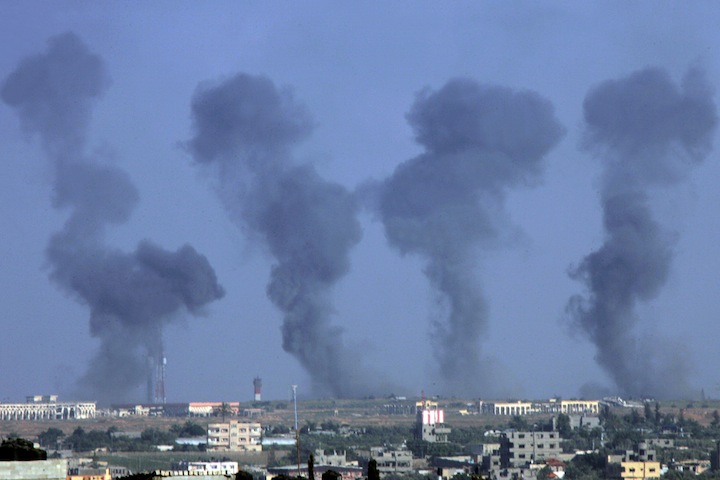Egypt and United States, usual brokers in cease-fires, may not help this time
Published July 8, 2014

Black smoke rising following an Israeli airstrike on the Gaza International Airport in Rafah, July 7, 2014. (Abed Rahim Khatib/Flash 90)
WASHINGTON (JTA) — Escalations between Hamas and Israel are nothing new. What’s missing this time, analysts say, is the alignment of outside interests that has resolved such fights in the past.
Egypt’s government lacks the influence over Hamas of its predecessors and the United States is in hand-washing mode on the Middle East, said Ami Ayalon, a former chief of the Shin Bet, Israel’s internal security service.
“In the past, Egyptians could play a major role and America had an interest” in pressing for cease-fires, Ayalon told JTA.
Now, he said, Egypt’s new president, Abdel Fattah al-Sisi, is strongly hostile to Hamas — a posture Israel appreciates but one that undercuts his ability to force a cease-fire — and the United States is not actively pressing for a truce.
“Today, the way it seems from here, America couldn’t care less,” Ayalon said.
The Obama administration issued a short statement Tuesday slamming the rocket fire from Gaza but not hinting at any U.S. intervention to bring the fighting to a halt.
“We strongly condemn the continuing rocket fire inside of Israel and the deliberate targeting of civilians by terrorist organizations in Gaza,” White House spokesman Josh Earnest said at the daily press briefing. “No country can accept rocket fire aimed at civilians, and we support Israel’s right to defend itself against these vicious attacks.”
In the current fighting, scores of missiles have rained down on Israel from Gaza. Hamas unveiled longer-range rockets that for the first time hit targets as far away as Jerusalem.
Palestinian officials told international media Tuesday that at least 15 people were killed in Israeli airstrikes.
Intensive U.S. interventions, in collaboration with Egypt, ended Gaza wars in 2009 and 2012.
Shlomo Brom, a former director of the Israeli army’s strategic planning division, said the United States had little choice but to hold back in the absence of Egyptian influence on Hamas.
“The United States doesn’t have much power in this situation because they don’t have leverage over Hamas,” said Brom, now the head of the program on Israeli-Palestinian relations at Israel’s Institute for National Security Studies. “The United States has leverage in Israel — but Israel is willing to have a cease-fire.”
Aaron David Miller, a former top U.S. Middle East negotiator, wrote that holding back for now made sense for the United States because to intervene and treat Hamas as an equal to Israel would undercut America’s preferred Palestinian interlocutor, the Palestinian Authority, led by President Mahmoud Abbas.
“The last thing Washington should be doing right now is bailing out Hamas, let alone engaging it directly or through cut-outs,” Miller, now a vice president at the Wilson Center, wrote in Foreign Policy.
The conflagration is fueled by a slew of incidents: the kidnapping and murder of three Israeli teens; Israel’s military campaign in the West Bank against Hamas, which it blamed for the kidnapping; retaliatory rocket fire from Palestinian factions in Gaza; and the murder of a Palestinian teen from eastern Jerusalem, apparently by Jewish extremists seeking revenge for the killings of the Israeli teens.
“This is the worst kind of a war,” said Ziad Asali, president of the American Task Force on Palestine, “where it is not planned, designed or desired by the leadership but gradually the logic is driven by passionate forces.”
Brom said even more extreme rivals cornered Hamas into escalation.
“If you will go back and see how it all began, the current conflict in the Gaza Strip, you can see that quite a number of days that those who were attacking Israel from the Gaza Strip were not Hamas but members of other militant groups in the Gaza Strip that were in opposition to Hamas,” Brom said. “These groups are interested in dragging Israel and Hamas into a wider conflict.”
Jonathan Schanzer, vice president for research at the Foundation for Defense of Democracies in Washington, said Israeli officials told him that Prime Minister Benjamin Netanyahu exercised restraint in Israel’s response to the rocket fire until a blitz of 80 rockets on Monday.
“That was the tipping point,” Schanzer said, speaking from Jerusalem. “Everybody we talked to made it clear Bibi was not interested in escalation.”
In a statement Tuesday evening, Netanyahu underscored his reluctance to have the situation escalate.
“This comes after our repeated efforts to restore calm were met with increased Hamas rocket fire,” he said. “Israel is not eager for war, but the security of our citizens is our primary consideration.”
![]()















